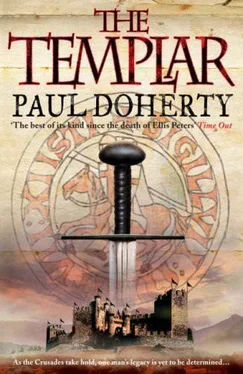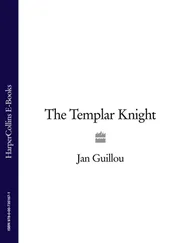P. Doherty - The Templar
Здесь есть возможность читать онлайн «P. Doherty - The Templar» весь текст электронной книги совершенно бесплатно (целиком полную версию без сокращений). В некоторых случаях можно слушать аудио, скачать через торрент в формате fb2 и присутствует краткое содержание. Год выпуска: 2010, ISBN: 2010, Издательство: Minotaur Books, Жанр: Исторические приключения, на английском языке. Описание произведения, (предисловие) а так же отзывы посетителей доступны на портале библиотеки ЛибКат.
- Название:The Templar
- Автор:
- Издательство:Minotaur Books
- Жанр:
- Год:2010
- ISBN:9780312576837
- Рейтинг книги:5 / 5. Голосов: 1
-
Избранное:Добавить в избранное
- Отзывы:
-
Ваша оценка:
- 100
- 1
- 2
- 3
- 4
- 5
The Templar: краткое содержание, описание и аннотация
Предлагаем к чтению аннотацию, описание, краткое содержание или предисловие (зависит от того, что написал сам автор книги «The Templar»). Если вы не нашли необходимую информацию о книге — напишите в комментариях, мы постараемся отыскать её.
The Templar — читать онлайн бесплатно полную книгу (весь текст) целиком
Ниже представлен текст книги, разбитый по страницам. Система сохранения места последней прочитанной страницы, позволяет с удобством читать онлайн бесплатно книгу «The Templar», без необходимости каждый раз заново искать на чём Вы остановились. Поставьте закладку, и сможете в любой момент перейти на страницу, на которой закончили чтение.
Интервал:
Закладка:
Hugh, Godefroi, Beltran and Theodore, now properly armoured, collected their oval shields and maces. Norbert and Alberic, faces flushed, joined the foot gathering behind the horse. Fresh fires, deliberately started, poured out more black smoke, concealing what was happening in the Army of God. The Turkish cavalry gathered again for the charge. Their stratagem was simple: to attack, pin the Franks against the walls of Nicea, destroy them and relieve the city. As Eleanor wrote later in her chronicle, the Turks made two mistakes. They believed that Count Raymond’s host was the entire Frankish army, and that its fighting qualities would be no better than those of Peter the Hermit’s ragged followers. They were soon proved wrong. In the early afternoon, the white-robed horsemen again poured like a waterfall down the slopes. The Franks, behind their screen of black smoke, watched, waited, then charged. The swift, heavy iron wall of mounted knights shattered the enemy and the Turkish line crumbled. The Franks swept through, cutting and slicing, drenching the ground in so much blood it poured in rivulets down the slopes, then turned and charged again. The Turks broke and fled. For a while the Franks hotly pursued them before returning in triumph to the camp, spears and lances displaying grisly trophies, herding lines of prisoners, the decapitated heads of their comrades tied around their necks.
The captives were paraded, taunted and humiliated. One of the catapults Alexius had provided was pushed down to the edge of the great moat around Nicea. As the sun set, the severed heads, gathered in fishing nets, were catapulted into the city. Some smashed in a gruesome pulp against the parapets. Others cleared the battlements, and even from where she stood, Eleanor could hear the groans of the population imprisoned behind the walls. Kilij Arslan had failed! The Army of God now turned on the prisoners. They were herded into the centre of the camp and forced to kneel so they could be decapitated. Simeon the scribe was amongst those captured in the baggage train. Desperately he pleaded for his life. The executioners ignored him. Eventually he broke free and fled through the camp, pursued by Gargoyle and Babewyn, the lieutenants of Jehan the Wolf. He ran screaming down the narrow lanes mocked and pushed by drunken spectators. Eleanor, who had retreated to her tent, heard the uproar and went outside. Simeon almost ran into her and collapsed at her feet. Babewyn and Gargoyle grasped him.
‘I did not beg, mistress.’ Simeon paused in his writing.
‘No, Simeon, you did not. You simply said you didn’t want to die. You claimed you were a Catholic captured by the Turks. If I remember correctly,’ Eleanor added drily, ‘you even quoted canon law, though that made little difference to those two grotesques.’
‘Camel turds,’ Simeon whispered. ‘But thanks to you, mistress-sister…’ He leaned forward. ‘Oh, by the way, can I take the oath as a Poor Brother of the Temple? I know things.’
‘Do you, Simeon?’ Eleanor narrowed her eyes.
‘I know secrets about the hidden things. I have heard the whispers.’
Eleanor glanced quickly at Imogene stretched out sleeping on a pile of cushions.
‘Simeon, I am always amazed at your skill for listening.’ She smiled. ‘But let us return to our chronicle.’
‘Of course, mistress-sister, though I must add my thanks to you and your noble brother for saving my life. I am so grateful…’
‘The chronicle, Simeon…’
‘Yes, mistress-sister…’
Babewyn had seized Simeon by the throat, struggling to keep him in position so that Gargoyle could swing his mace. Eleanor had screamed at them to stop, but only the arrival of Hugh and Godefroi, their swords drawn, forced the two killers to retreat. Drunk and mouthing filthy curses, they staggered away. Eleanor took Simeon into her entourage as the Army of God turned from celebrating its victory to the grim business of besieging Nicea. The city baffled them. No such fortifications had faced a Frankish army in the west. They also had no boats, so attack from the lake was impossible. The moat in front of the walls stretched over two yards wide and the same deep. The first defensive wall beyond was at least six feet thick and nine yards high, with towers jutting out to defend the approaches. Even if this was breached, the towering curtain wall behind it, eighteen feet thick, was protected by a fresh range of towers from where archers and slingers, not to mention engines of war, could rake attackers with a blizzard of missiles. Frustration mounted amongst the Army of God. The jubilation over Arslan’s defeat soon evaporated as they tried desperately to take the city. The moat was filled in at a certain point and makeshift catapults and mangonels pushed across. They and the soldiers who manned them were swiftly engulfed in a flood of arrows, stones, javelins and sheets of roaring flame. Mantlets, screens of aspen and willow woven together, were built to protect the archers, but these too were ravaged by oily fire poured from the battlements.
One morning Count Raymond, escorted by Hugh, Godefroi, Eleanor and others from the Poor Brethren, rode out along the moat to search for any weakness. From the fortifications rose jeering insults and a rain of arrows, which fell short. It was a clear, warm day, the breeze sweet with the fragrance of pine, cypress and the fruits ripening in the nearby orchards. The count reined in.
‘We have plenty of wood,’ Raymond’s one good eye glared at Hugh and Godefroi as he gestured at the trees, ‘but what can we do with it?’
Hugh grasped the reins of the count’s horse. ‘Come, my lord, there is something.’ They galloped further along the evil-smelling moat.
Eleanor found the palfrey she had been given sluggish, reluctant to move, so Theodore reined in, moving between her and the Turks lining the battlements. He grasped the palfrey’s reins and winked at Eleanor.
‘Just in case,’ he murmured, ‘the Turks might glimpse your beauty and sally out.’
Eleanor blushed, and Theodore began to sing a troubadour song about a maid locked in a tower. Eventually Hugh led them to the most eastern part of the wall.
‘Look, my lord.’
Eleanor followed her brother’s direction.
‘Theodore told me about this,’ continued Hugh. ‘Stare hard at the base of the tower: the brickwork is crumbling, the legacy of a previous siege.’
Count Raymond stared, then clapped his hands in glee. Two days later a testudo, fashioned out of cypress, willow and aspen under a roof of holm oak, its leather covering saturated with wet sand, crossed the makeshift bridge to pound at what Eleanor had christened ‘the Leaning Tower’. Archers sheltered beneath the eaves of the testudo’s broad sloping roof and loosed at the enemy along the battlements. The engineers soon broke through the wall, shoring up the breach with beams as they picked feverishly at the crumbling masonry behind. Eleanor stood watching, safe behind a line of shielded carts. The tower collapsed just as darkness fell, but the following morning the camp was roused by trumpet cries. Eleanor, bleary-eyed, rushed out of her tent and joined the throng streaming down through the shifting mist to the eastern side of the moat. They stopped and stared in disbelief of the Leaning Tower. During the night, the defenders, working feverishly, had repaired the breach. Count Raymond’s anger knew no bounds, and like Achilles, he retreated to sulk in his tent while other leaders pressed on with the siege. Yet despite Kilij Arslan’s defeat, the Niceans were ferocious in the defence of their city. The enemy had desecrated their dead so they retaliated by lowering hooks on ropes to seize the corpses of Franks; these were pulled up, stripped and hung over the walls to rot. If the Army of God attacked, stone and arrow shattered head and neck; if the Franks broke through, they were swiftly deluged by flaming missiles.
Читать дальшеИнтервал:
Закладка:
Похожие книги на «The Templar»
Представляем Вашему вниманию похожие книги на «The Templar» списком для выбора. Мы отобрали схожую по названию и смыслу литературу в надежде предоставить читателям больше вариантов отыскать новые, интересные, ещё непрочитанные произведения.
Обсуждение, отзывы о книге «The Templar» и просто собственные мнения читателей. Оставьте ваши комментарии, напишите, что Вы думаете о произведении, его смысле или главных героях. Укажите что конкретно понравилось, а что нет, и почему Вы так считаете.












